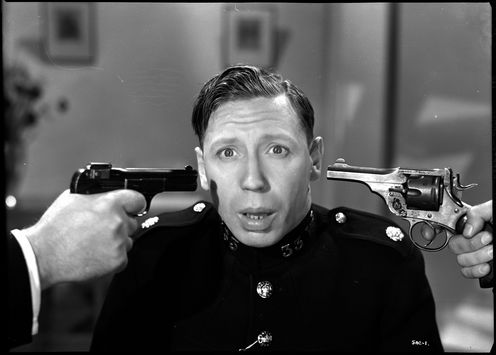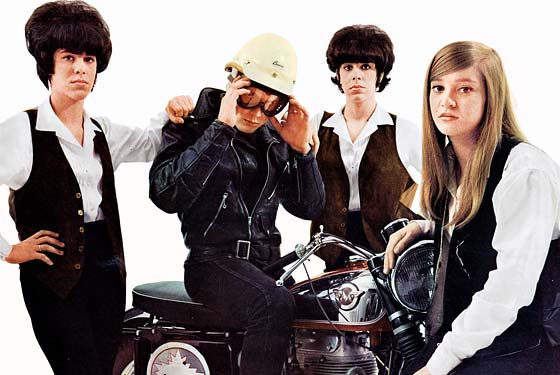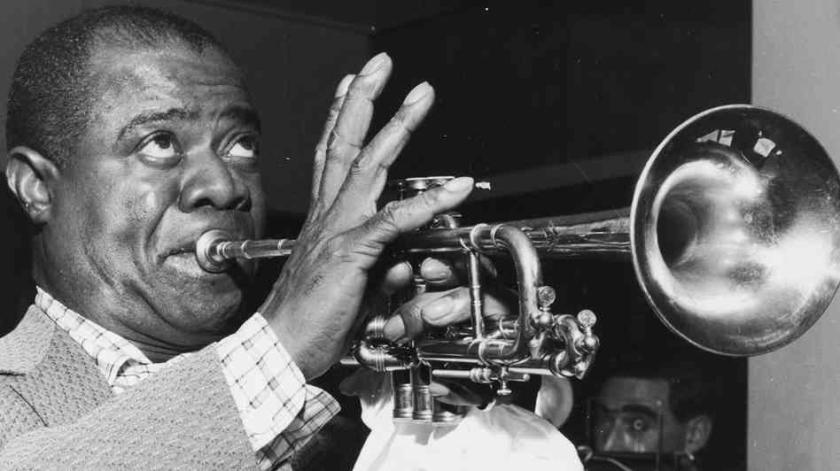The most notorious case of the BBC banning a pop record was the episode of the Sex Pistols' "God Save the Queen" in 1977, which was of course the year of Her Maj's Silver Jubilee. "That was genuinely dangerous," Paul Morley intoned gravely (the record that is, rather than its banning), though as with several of the cases examined here, this one wasn't quite as open and shut as it seemed.
The Beeb had been cheerfully - or at least unprotestingly - airing the disc on radio until the moment when the band swore at Bill Grundy on TV. It was Malcolm McLaren's bizarrely-dressed band of urchins running amok across the beige prairies of teatime telly that freaked the BBC out. This evidently seemed to them more likely to unseat the monarch or send the remains of Empire to the bottom of the sea than the Pistols' coruscating recordings.
 It was the lesser-known examples of banning-hood that supplied the most intriguing parts of this entertaining (if not too profound) doc. For instance, during World War Two the Corporation became extremely hostile to crooners from the USA, seemingly because their "American sentimentalisation of emotion" threatened to undermine the nation's fighting spirit. Bing Crosby's "I'll Be Home for Christmas" was singled out for special opprobrium.
It was the lesser-known examples of banning-hood that supplied the most intriguing parts of this entertaining (if not too profound) doc. For instance, during World War Two the Corporation became extremely hostile to crooners from the USA, seemingly because their "American sentimentalisation of emotion" threatened to undermine the nation's fighting spirit. Bing Crosby's "I'll Be Home for Christmas" was singled out for special opprobrium.
Wind back to the 1930s, and we found that cheeky George Formby (above, meeting his critics) was a serial offender with his ridiculous - though suggestive - songs about "My Little Ukulele" (which was banned and then unbanned after a judicious title-change) or, even worse, "My Little Stick of Blackpool Rock", up with which the BBC indignantly refused to put. It was time for a bit of sociology to prop all this up, so writer Lucy O'Brien popped in with a soundbite about the Corporation "censoring working class expression", since ghastly northerners like Formby or Gracie Fields weren't considered quite proper for the London-centric middle classes amid whom the BBC plied its trade.
In 1956 the Beeb's draconian Dance Music Policy Committee (a sort of pipe-smoking Gestapo of the airwaves) took umbrage at Louis Armstrong's recording of "Mac the Knife", Brecht and Weill's lurid depiction of the unsavoury Macheath. The song's allusions to the grotesque crimes of Jack the Ripper didn't go down well with the Committee, but as Christopher Frayling pointed out, what really got them going was a spate of real-life knife crimes which happened to be in the news at the time.
 There was a very good bit about the Shangri-Las' "Leader of the Pack", with Mark Ellen delivering a comic overview of the strange phenomenon of "splatter platters" as we pondered how the BBC banned this tale of a tragically defunct motorcyclist in a climate of warring Mods and Rockers in British seaside resorts (The Shangri-Las, above). Meanwhile, it was almost shocking to be reminded of the Corporation's erstwhile hypersensitivity about product placement. It's barely noticeable nowadays, but it caused them to suppress Mott the Hoople's "All the Young Dudes" until its writer David Bowie removed a line about "stealing clothes from Marks and Sparks " - how the struggling M&S would love to catch pop stars nicking their gear now! - and also meant zero tolerance for songs like Dr Hook's "Cover of the Rolling Stone", the Kinks' "Lola" and Paul Simon's "Kodachrome".
There was a very good bit about the Shangri-Las' "Leader of the Pack", with Mark Ellen delivering a comic overview of the strange phenomenon of "splatter platters" as we pondered how the BBC banned this tale of a tragically defunct motorcyclist in a climate of warring Mods and Rockers in British seaside resorts (The Shangri-Las, above). Meanwhile, it was almost shocking to be reminded of the Corporation's erstwhile hypersensitivity about product placement. It's barely noticeable nowadays, but it caused them to suppress Mott the Hoople's "All the Young Dudes" until its writer David Bowie removed a line about "stealing clothes from Marks and Sparks " - how the struggling M&S would love to catch pop stars nicking their gear now! - and also meant zero tolerance for songs like Dr Hook's "Cover of the Rolling Stone", the Kinks' "Lola" and Paul Simon's "Kodachrome".
But the most thought-provoking specimen came last, which was the cunningly-planned online promotion of "Ding Dong! The Witch Is Dead" to un-mourn Margaret Thatcher's death last year. "They don't ban things any more, they just don't play them," said music journalist Jon Robb, though in this case the Beeb elected to play just a few seconds of the song. The publicly-funded broadcaster could hardly have risked seeming to dance on the grave of this particular 87-year-old dementia sufferer.















Add comment